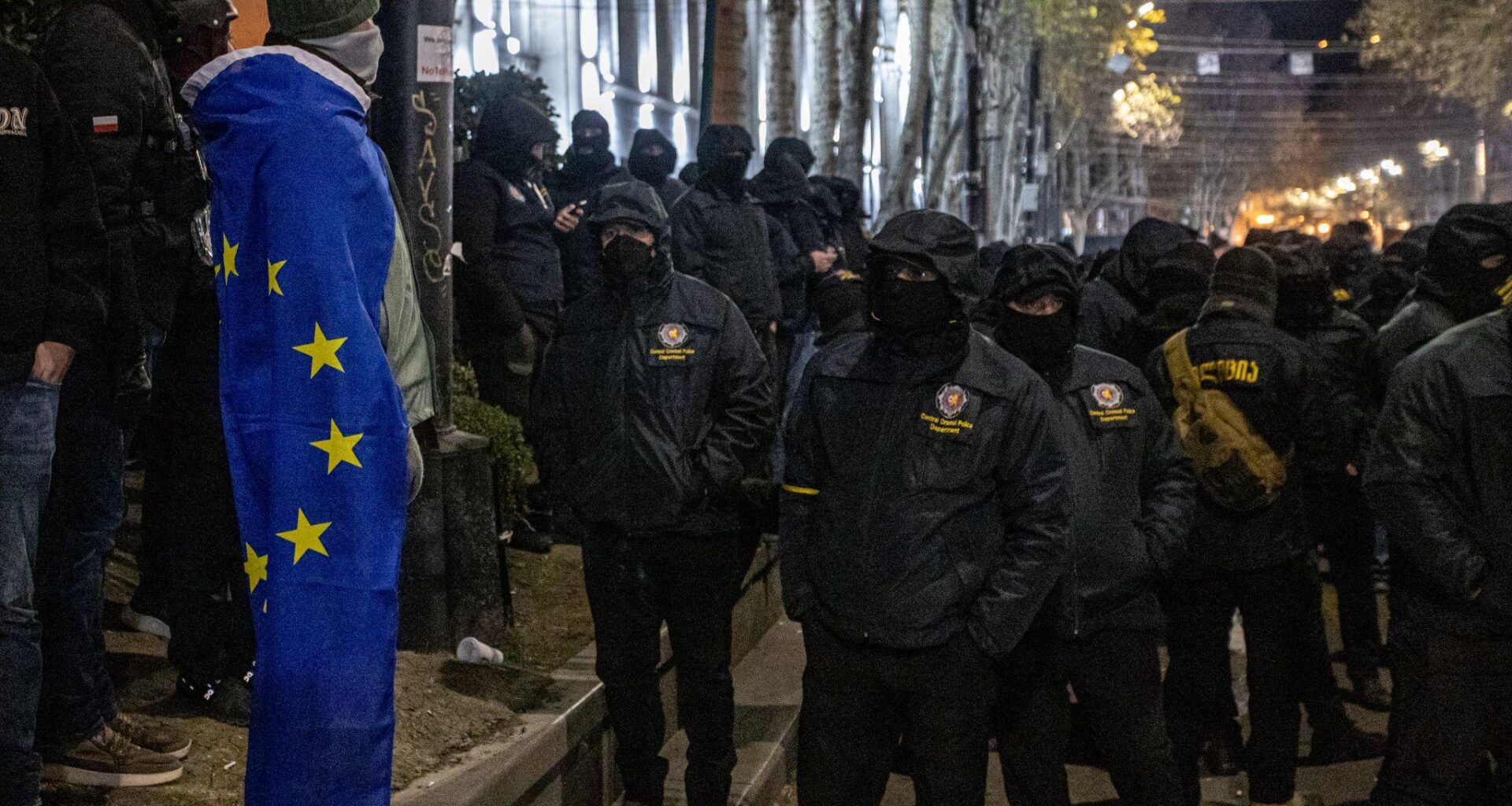Tbilisi, Georgia -- For just over two weeks, Giorgi, a young activist, and his friends have been meeting in front of Parliament every evening. “We're trying to organize ourselves. We're demonstrating better today than we did two weeks ago,” he confides.
On this day of the presidential election, the grassroots movement that wants to counter Russian influence in the country and integrate with the European Union tried to make its demands heard by gathering in front of Parliament. “They [the Georgian Dream] simply want to establish a dictatorship in Georgia,” he states.
Rustaveli Avenue, the city's main thoroughfare running alongside Parliament, is packed with people. After a day of nationwide protests against the election of Georgia's new pro-Russian president, seen as a puppet of the Bidzina Ivanishvili oligarchy and the ruling regime, the crowd of demonstrators is chanting: “This president is not legitimate.”
“Tonight will be very violent,” one activist says. Several vehicles equipped with a water cannon, specially designed for riot control, are positioned down Rustaveli Avenue.
The police presence is simply massive. Thousands of men in uniform, all wearing menacing black balaclavas, are blocking access along the avenue.
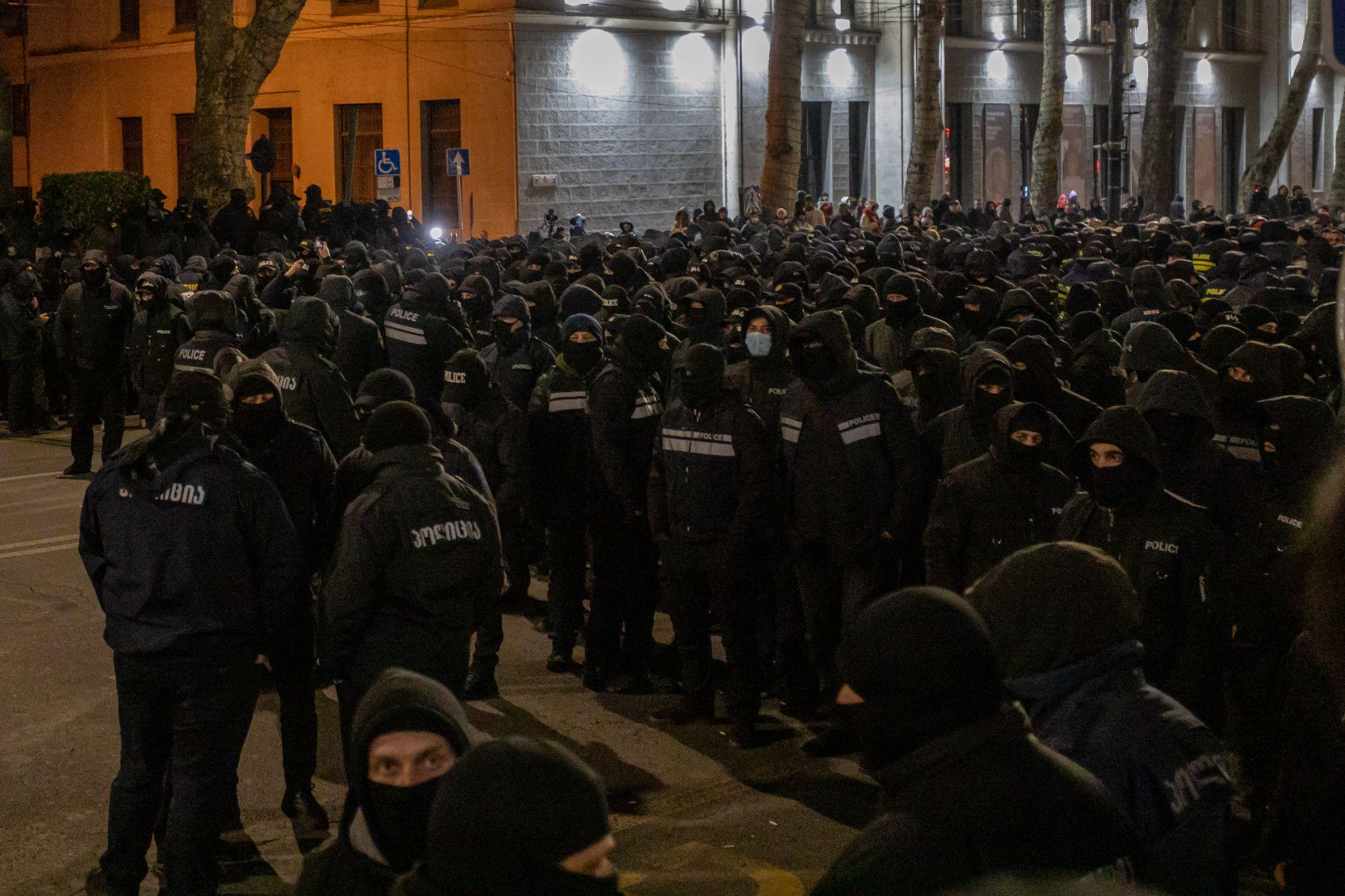
Demonstrators from self-defense groups organized by the popular movement are working to keep protesters away from the police lines.
"The police always strike first. Once they start, we can't stop them,” explains one of them. “If we want the demonstration to go smoothly, without deaths, we have to avoid getting too close,” he notes in the direction of the crowd.
The Georgian Dream announced that if the demonstrators were violent, there would be “two or three sacrifices” -- in their words -- if the protests gained momentum.
“The police are the armed arm of the oligarchy in Georgia,” cut in another protester behind him. But the police aren't the only threat to peaceful protesters. One protester warns passers-by: two groups of titushky, men paid by the regime, are crowding the streets adjacent to the main artery. “These men are very dangerous; some have combat experience,” he warns.
The government "crackdown squads" aka "titushky" deployed against #GeorgiaProtests participants target opposition media and politicians
— Euromaidan Press (@EuromaidanPress) December 7, 2024
Here they are seen attacking opposition politician Koba Khahadzi outside the office of @coalitionGEo (Coalition for Change)
🎥Security… pic.twitter.com/6MdephAUyJ
This climate of terror created by the Georgian Dream is designed to dissuade demonstrators from gathering. Despite this, tens of thousands of people turned out at the peak of the demonstration.
In an act of pure provocation, the Georgian Dream had planned to light the Christmas decorations and the big Christmas tree, and the new president was due to give an address on the square in front of Parliament, in the center of Rustaveli Avenue, at 20:00.
Titushky (regime thugs) grabbed a guy inside a metro wagon but they were forced out by the people at the next station. #terrorinGeorgia #GeorgiaProtests
— Marika Mikiashvili 🇬🇪🇺🇦🇪🇺 (@Mikiashvili_M) December 16, 2024
📷 Ninia Burchuladze pic.twitter.com/GAdF5W2sRa
Faced with popular pressure and the large crowd gathered in front of Parliament, the speech was canceled at 19:30. Cries of joy exploded along Rustaveli Avenue. “It's our only victory of the day,” reassures a demonstrator, a broad smile on his lips.
The Tbilisi mayor backed off from his plan to light the Christmas tree in front of parliament today after calls for pro-EU protesters to gather at the spot
— Euromaidan Press (@EuromaidanPress) December 14, 2024
Georgia's current president Salome Zourabichvili visited the crowd, cheered on by protesters who were protesting the… https://t.co/598bn07WfL
At the same time, Salomé Zourabichvili, the current pro-European president who has made a complete break with the government and the Georgian Dream, makes an appearance at the bottom of Rustaveli Avenue.
“Tonight, the Christmas lights won't be lit. Stay peaceful, stay united, and I'm with you. We will not allow any provocation here. I am with you, you are in my heart,” she declares.
However, she was unable to make her way up to Parliament because a police cordon blocked her path.
Slogans such as “Long live Georgia” were chanted, and demonstrators played soccer to mark the irony of the president's former career as a Manchester City player.
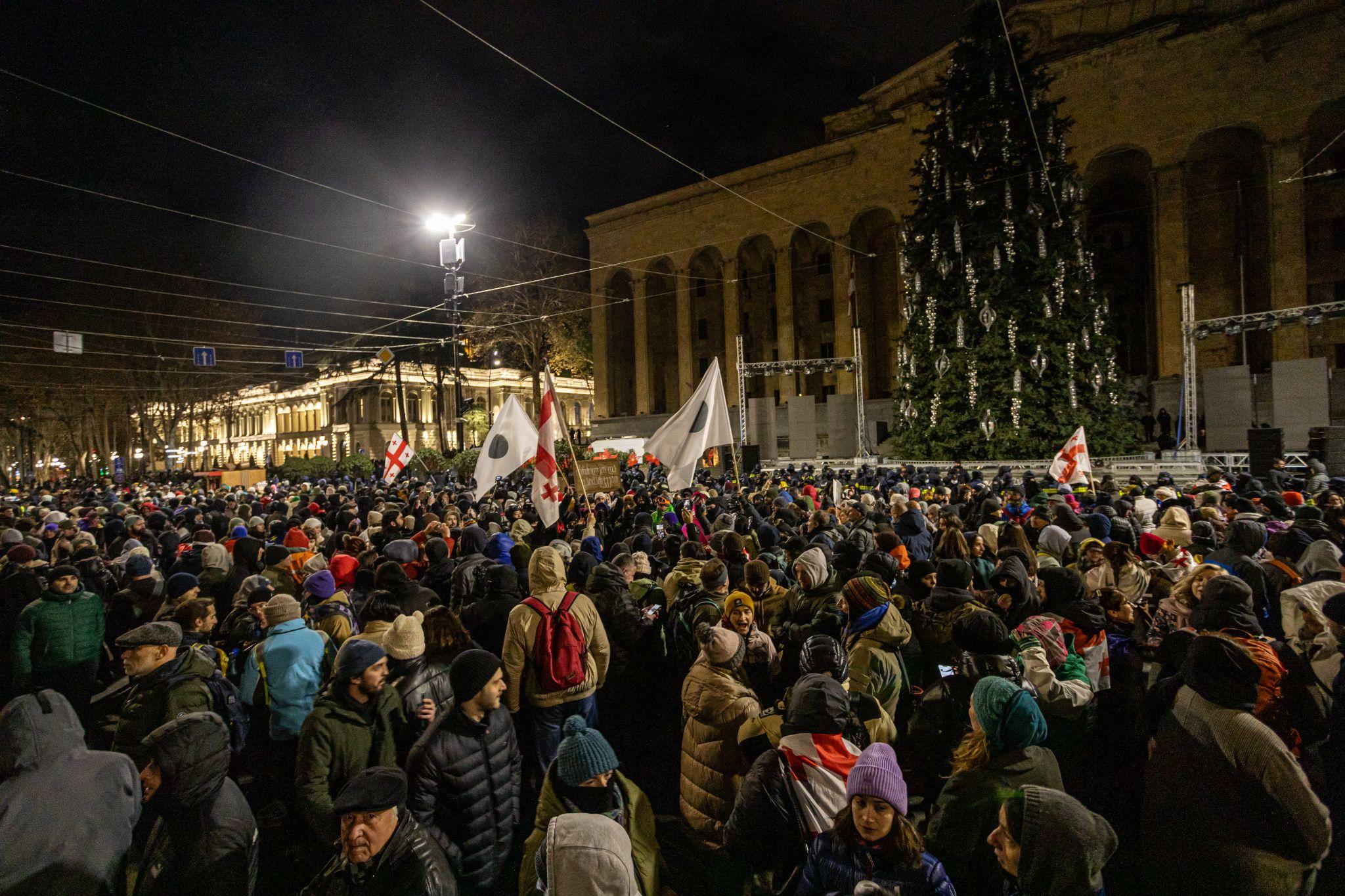
Shortly after 22:00 in an unexpected move, the police officers who had been tightening their grip on the various groups and segments of Rustaveli Avenue withdrew.
However, despite the opposition's expectations, the demonstration fizzled out relatively quickly.
“As the demonstrations lasted all day, we were at the limit, just below,” explains a highly-placed source in the opposition.
No water cannon or tear gas was used that evening. A victory for the Georgian Dream, which used the event to reinforce its propaganda narrative, claiming that the movement was running out of steam.
In another seeming victory, the Georgian Dream elected a new president of Georgia, despite claiming its victory in rigged elections on 26 October and the democratic opposition parties' boycott of parliament.
A new pro-Russian president casts a pall of uncertainty over Georgia's democratic future
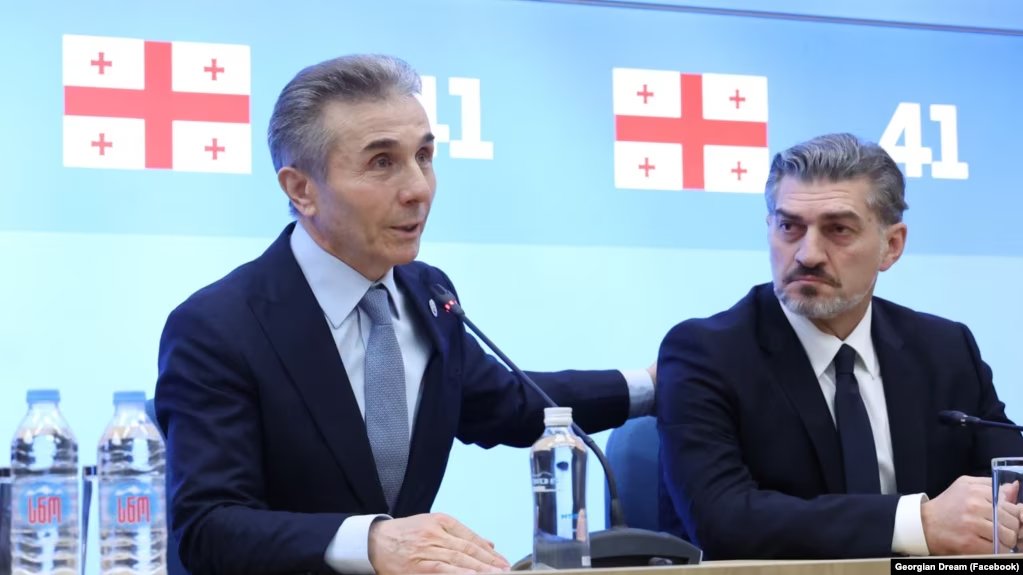
This is the first time in Georgia's modern political history that the president has not been elected by direct universal suffrage.
Following constitutional reform in 2019 conducted by the Georgian Dream, the office of president in Georgia is now elected by an electoral college of 300 members, including 150 deputies from parliament and 150 representatives of municipal councils.
This reform has been criticized by the opposition, which sees it as a move to strengthen the ruling party's control over the electoral process. The Georgian Dream's electors elected Mikhail Kavelashvili, 53, as president, in an empty-sounding hemicycle.
The other elected representatives stood alongside the thousands of demonstrators outside Parliament, displaying a red card to mock the footballer-president.
Some protesters hold red cards for Mikheil Kavelashvili, to be appointed president. He is a former football player. Earlier protesters also brought diplomas here as allegedly Kavelashvili doesn't have one. pic.twitter.com/9GmNIpjQAF
— Mariam Nikuradze (@mari_nikuradze) December 14, 2024
After an honest career as a striker (1988-2007), in which he was an international and also played a part in the descent of English club Manchester City into the second division (1996), this footballer without a degree has no massive political background.
Kavelashvili, a pro-Russian nationalist, does not dispute Moscow's occupation of 20% of Georgian territory, and his anti-Western and anti-LGBT+ discourse is often conspiratorial. For example, he told parliament that Western intelligence agencies were trying to push Georgia into war with Russia, reiterating the Georgian Dream's ubiquitous propaganda.
Svetoslav Malinov, information analyst at the Center for the Study of Democracy, explains:
“Russian disinformation operations in Georgia are multifaceted, targeting the country's independence, territorial integrity, and pro-Western aspirations. False narratives about 'color revolutions' and Western conspiracies, including claims of a planned 'Euromaidan-style' uprising orchestrated by the EU and US, aim to erode trust in Western institutions and foster anti-EU sentiment.”
Mikhail Kavelashvili fits perfectly into this mechanism.
After carrying the colors of the Georgian Dream in Parliament since 2016, he set up his own party in 2022, Power to the People. This did not prevent him from being endorsed by the billionaire who controls the Georgian Dream, Bidzina Ivanishvili, for the presidency.
In May, his party, in agreement with the Georgian Dream, introduced the controversial law on "foreign agents," which aims to bring independent media and NGOs to heel, Russian-style.
Mikhail Kavelashvili will not question the freezing of Georgia's EU accession process in November, as he believes that the West fuels the polarization of Georgian society.
In his view, the “purity of traditional Georgian values” should be defended instead.
However, the current head of state, Salome Zourabichvili, who has broken with the government, denounced the vote as “illegitimate” and declared that she would refuse to return to office until new parliamentary elections are held.
“Salomé Zourabichvili is the last political figure to have come to power in Georgia democratically,” a source very close to the President says.
At 14:00, the announcement of the new president elicited the first reaction from Ilham Aliyev, the dictator of Azerbaijan, who congratulated the newly-elected president. “It's never a good sign when the first reactions come from dictators,” quipped one demonstrator.
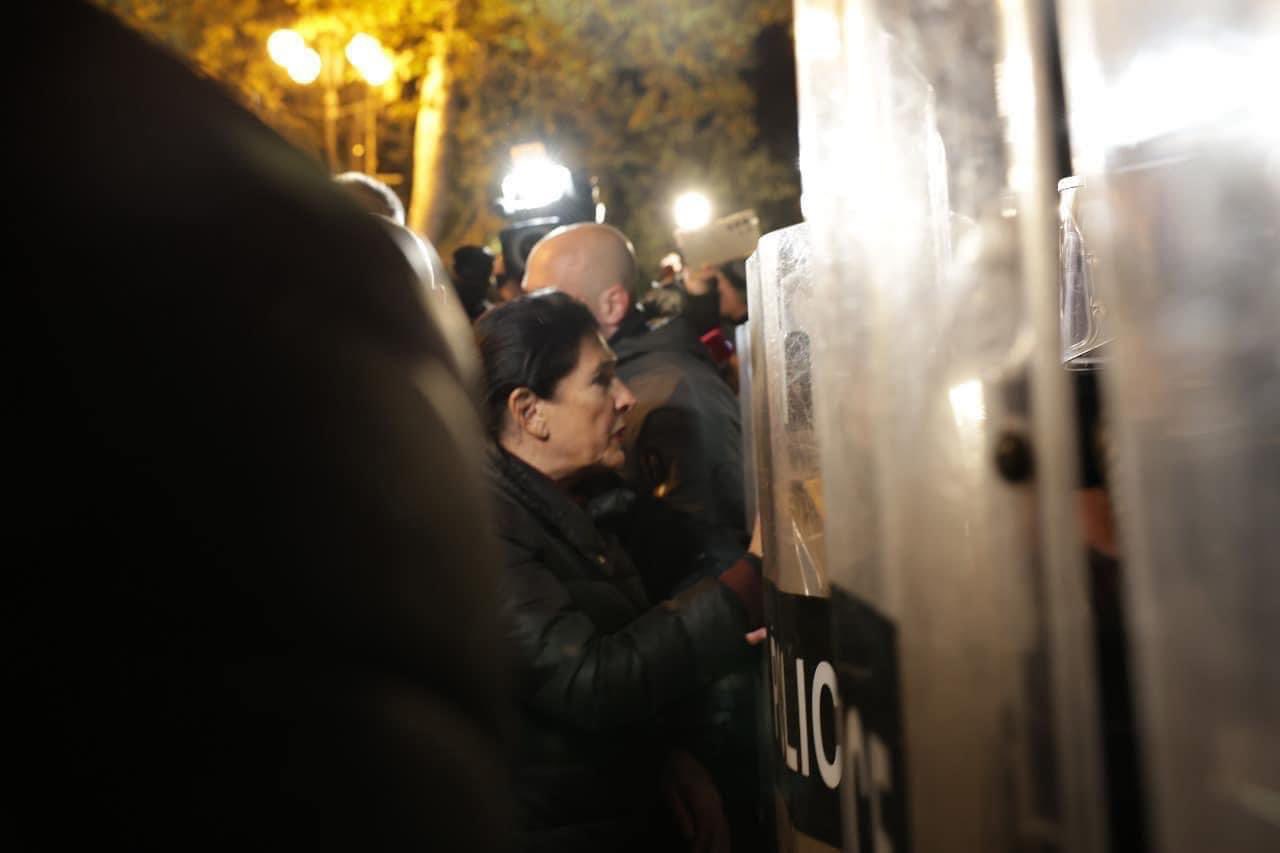
Salome Zourabichvili, the ultimate democratic bulwark
“We're waiting for international sanctions to be put in place -- it's our only hope of starting to get things moving, but Europe-wide sanctions are being blocked by Hungary and Viktor Orban,” says László Róbert Mézes, a Hungarian activist who is very vocal in the movement
Many fear that the popular and democratic movement is losing momentum. The Georgian Dream is banking on the absence of a leader to break the movement.
Georgian President Salome Zourabichvili continues to attend #GeorgiaProtests, declaring that she will stay in office beyond her term
— Euromaidan Press (@EuromaidanPress) December 14, 2024
Her term was to end today, as today, the single-party parliament elected a new president in what critics describe as the pro-Russian Georgian… https://t.co/0Vx8ds1uAZ
“For the moment, Salome Zourabichvili is our leader,” assures an activist who is trying to organize actions but prefers to remain anonymous for fear of repression.
All are anxiously awaiting 29 December, the date on which the demonstrators plan to occupy the presidential palace to protect President Zourabichvili.
“It will no longer be a question of ideals. It will be about the physical person of our President Zourabichvili. The Georgian Dream will not leave Madame Zourabichvili in the presidential palace,” asserts one protester.
“She has warned that she will not leave the presidential palace until there are free and fair elections,” he continues. “Are we ready to assume the defense, perhaps at the cost of our lives? I don't know. But I am,” he declares with determination.
His wrinkled eyes betray a hint of apprehension.
Related:
- Georgia elects “illegitimate” pro-Russian president as 65% back ongoing EU protests
- How Georgia’s pro-EU movement built its own intelligence network
- Stolen election: how the Georgian Dream helped itself to 15% of all votes cast
- Georgian president refuses to step down, rallies national resistance to Russian influence
- Pro-Russian party cements victory. Can Georgia’s revolution succeed?

